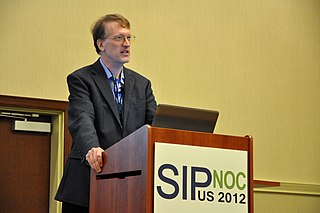William Allan Wulf was an American computer scientist notable for his work in programming languages and compilers.

Paul V. Mockapetris is an American computer scientist and Internet pioneer, who invented the Internet Domain Name System (DNS).

Chester Gordon Bell was an American electrical engineer and manager. An early employee of Digital Equipment Corporation (DEC), from 1960–1966, Bell designed several of their PDP machines and later served as the company's Vice President of Engineering from 1972–1983, overseeing development of the VAX computer systems. Bell's later career included roles as an entrepreneur, investor, founding Assistant Director of NSF's Computing and Information Science and Engineering Directorate from 1986–1987, and researcher emeritus at Microsoft Research from 1995–2015.
The annual SIGCOMM Awardfor Lifetime Contribution recognizes lifetime contribution to the field of communication networks. The award is presented in the annual SIGCOMM Technical Conference.
Scott J. Shenker is an American computer scientist, and professor of computer science at the University of California, Berkeley. He is also the leader of the Extensible Internet Group at the International Computer Science Institute in Berkeley, California.

Simon S. Lam is an American computer scientist and Internet pioneer. He retired in 2018 from The University of Texas at Austin as Professor Emeritus and Regents' Chair Emeritus in Computer Science #1. He made seminal and important contributions to transport layer security, packet network verification, as well as network protocol design, verification, and performance analysis.

Larry Roberts was an American computer scientist and Internet pioneer.
Donald Fred Towsley is an American computer scientist who has been a distinguished university professor in the College of Information and Computer Sciences at the University of Massachusetts Amherst.

Alexander G. Fraser, also known as A. G. Fraser and Sandy Fraser, was a noted British-American computer scientist and the former Chief Scientist of AT&T.

Dr. Abdelsalam (Sumi) Helal is a computer scientist who was born in Suez, Egypt. He graduated from Alexandria University in 1982. He is best known for his work in Pervasive Computing, Mobile computing and the Internet of Things, and their human-centric applications in the domains of aging, personal health and disability. He is a professor at the Computer and Information Science and Engineering Department at the University of Florida and the director of its Mobile and Pervasive Computing Laboratory

Henning Schulzrinne is a German-American computer engineer who led research and development of the voice over IP network protocols.

Victor Bahl is an American Technical Fellow and CTO of Azure for Operators at Microsoft. He started networking research at Microsoft. He is known for his research contributions to white space radio data networks, radio signal-strength based indoor positioning systems, multi-radio wireless systems, wireless network virtualization, edge computing, and for bringing wireless links into the datacenter. He is also known for his leadership of the mobile computing community as the co-founder of the ACM Special Interest Group on Mobility of Systems, Users, Data, and Computing (SIGMOBILE). He is the founder of international conference on Mobile Systems, Applications, and Services Conference (MobiSys), and the founder of ACM Mobile Computing and Communications Review, a quarterly scientific journal that publishes peer-reviewed technical papers, opinion columns, and news stories related to wireless communications and mobility. Bahl has received important awards; delivered dozens of keynotes and plenary talks at conferences and workshops; delivered over six dozen distinguished seminars at universities; written over hundred papers with more than 65,000 citations and awarded over 100 US and international patents. He is a Fellow of the Association for Computing Machinery, IEEE, and American Association for the Advancement of Science.
Keith W. Ross is an American scholar of computer science whose research has focused on Markov decision processes, queuing theory, computer networks, peer-to-peer networks, Internet privacy, social networks, and deep reinforcement learning. He is the Dean of Engineering and Computer Science at NYU Shanghai and a computer science professor at the New York University Tandon School of Engineering.
Baba C. Vemuri is the Wilson and Marie Collins Professor of Engineering and a Distinguished Professor at the Computer and Information Sciences and Engineering Department of the University of Florida. He is also the Director of Laboratory for Vision Graphics and Medical Imaging at University of Florida.
Yunhao Liu is a Chinese computer scientist. He is the Dean of Global Innovation Exchange (GIX) at Tsinghua University.
Weisong Shi is a computer scientist, known for his leadership in fostering the edge computing research community. He is currently an Alumni Distinguished Professor and Department Chair of Computer and Information Sciences at University of Delaware in Newark, Delaware, where he leads the Connected and Autonomous Research (CAR) Laboratory. He is an internationally renowned expert in Edge Computing and Autonomous Vehicles. He was named a Fellow of the Institute of Electrical and Electronics Engineers (IEEE) in 2016 for his contributions to distributed systems and Internet computing. He is the Editor-in-Chief of IEEE Internet Computing Magazine and the inaugural Editor-in-Chief of Elsevier Smart Health Journal.
Sunghyun Choi is an electrical engineer and academic.

Farnam Jahanian is an Iranian-American computer scientist, entrepreneur, and academic. He serves as the 10th president of Carnegie Mellon University.

Craig Partridge is an American computer scientist, known for his contributions to the technical development of the Internet.
Wonjun Lee (Korean: 이원준) is a professor of Department of Cyber Defense, School of Cybersecurity at Korea University in Seoul, South Korea. His research interests include communication and network protocols, wireless communication and networking optimization techniques, security and privacy in mobile computing, and RF-powered computing and networking. He has authored 15 international patents, over 250 papers in refereed international journals and conferences, and a book “Optimal Coverage in Wireless Sensor Networks,” Springer, 2020.










